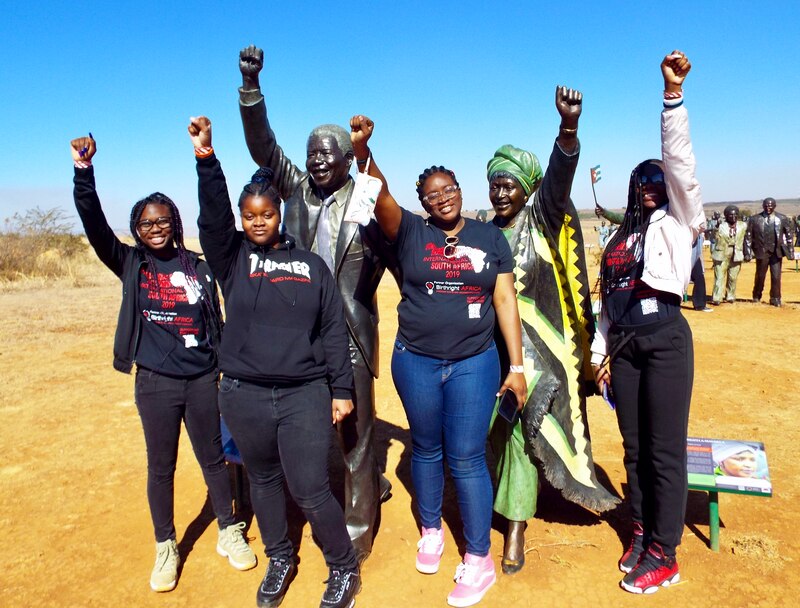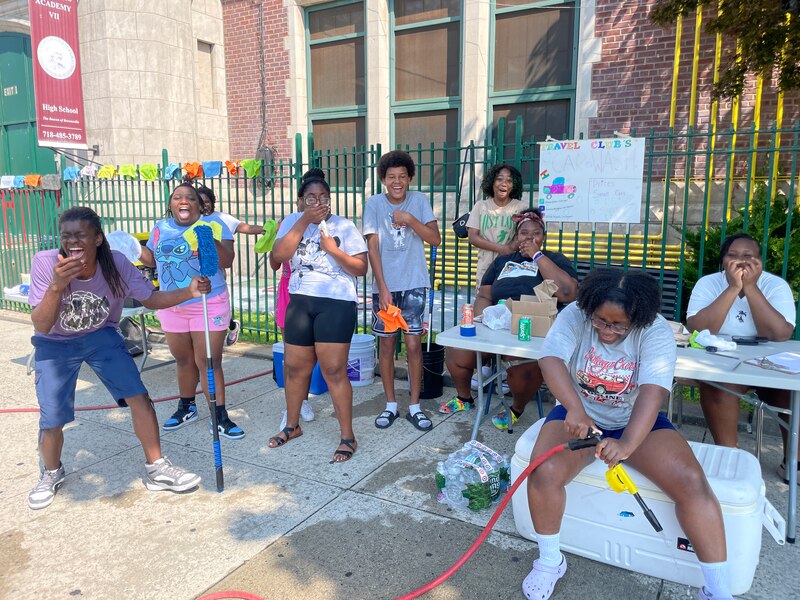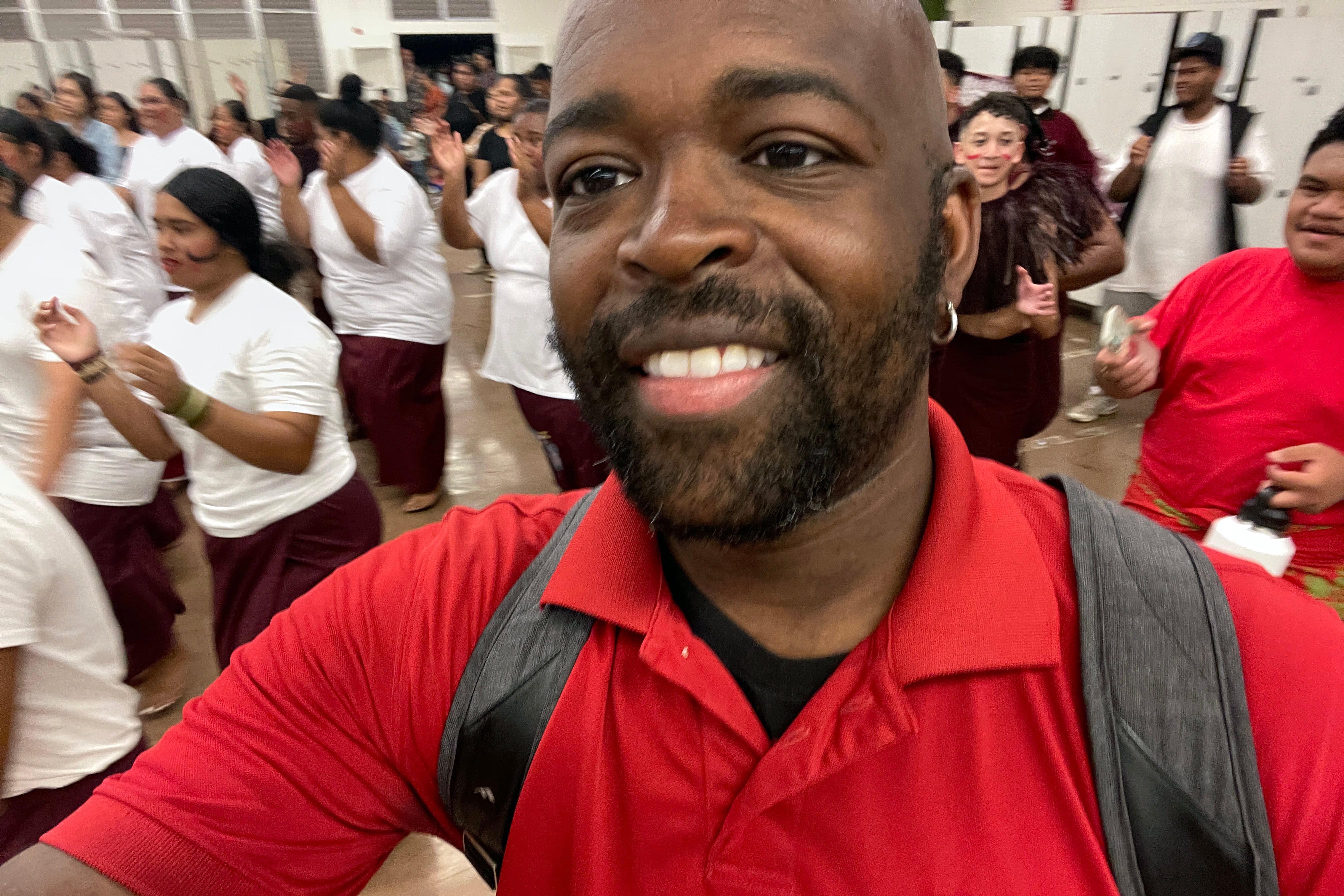Bijoun Eric Jordan took a gap year abroad after finishing college in 2003, teaching English as a second language in Madrid and Barcelona.
It’s an experience he continues to hold onto, and it has shaped his approach at Frederick Douglass Academy VII High School, in Brownsville, Brooklyn, where’s taught English the past 17 years.
Jordan makes sure his students get a chance to travel — and not just to museums across New York City. His students travel around the globe. In 2016, Jordan took his students to Spain. He followed with trips to Japan, South Africa, and Hawaii. Later this month, he’s taking students to Ghana. They plan to spend 10 days in the capital city of Accra and the surrounding areas.
“The 14 scholars and four chaperones in our group are all of African descent; we are following our roots back to where they lead us,” Jordan said. “For anyone who hasn’t heard of the Ghanaian principle of sankofa, this is it! It means ‘go back and get it,’ or that by going and exploring our heritage, we receive knowledge that will guide us forward.”
Jordan, who teaches AP English Literature and Composition as well as English to juniors, said that making his school’s ”Brownsville Abroad” happen is no simple feat in Brooklyn’s highest-poverty neighborhood.
Families pay a portion of the cost of travel, usually about 15%, and the program fundraises to cover the rest. The students have raised money by organizing a car wash, an art auction, and a 5K run in Prospect Park, and by selling soda, water, and ice cream. They’ve crowdfunded and partnered with organizations like Birthright AFRICA and Boys and Girls’ Elbaum Family Clubhouse. (Their travel fund is at gofundme.com/Brownsville-to-Ghana.)
But the experience is priceless.
“I say, even as an English teacher, that there are some things we just can’t learn inside books or in the walls of a classroom. There’s a way that you walk differently when you have certain experiences behind or within you,” Jordan said about why he prioritizes travel for his students. “There are areas where you just know better or won’t fall for lies and deception because of what you have seen with your own eyes.”

This interview has been lightly edited for length and clarity.
How and when did you decide to become a teacher?
I’m really not sure because it was a very early decision, by the time I was in middle school. I mostly enjoyed school, especially the classroom itself as a theater of discovery and a forum. I’ve always loved that part.
And I’ve been fortunate to have had many great teachers who made it look rewarding, and so it just made sense to select a career where I can work with young people all the time, who are never boring, and everything we are doing is setting the stage for so much.
It’s a hell of a privilege, really.
Tell us about the upcoming trip to Ghana? Why are you taking students there?
This journey is going to change how our scholars see themselves, Africa, the world, everything. I expect to see a new kind of pride in them.
Our scholars will have the chance to receive an official Ghanaian name based on their lineage, go to school for a day, attend the Chale Wote Arts Festival and help create a mural, visit the necessary museums and memorials to learn history, and witness places where our ancestors were enslaved. They will also visit an Afrobeats studio and compose an original piece. And there will be more, of course.
There are rich, transformative, and sometimes challenging experiences we are inviting our scholars into, but the biggest point of it all is for them to see what Ghana was and is through their own eyes.
More people in the African diaspora now have the privilege — and I believe, the responsibility — to return “home” in any way we can and to spread true knowledge of home to our young people. Brownsville Abroad is our access at this point, right now.
I’m clear that this trip represents a homegoing, and I’m told that’s how Ghanaians operate, so this will be a really meaningful journey.
How have you been preparing the students for the trip? What’s been your favorite lesson to teach in advance of the trip?
We are an after-school club that meets once a week for part of the year, and that is where we plan all our activities and fundraisers as well as some time for studying and finding out what our scholars want to know and do.

My favorite prep activity would have to be our visit to the National Museum of African American History and Culture in Washington, D.C. Our Ghana scholars had time to begin to explore and process quite a lot of history, but in a way more immersive and interactive way than what we could present in the building.
I loved that students were able to find out about so many topics and time periods, but they observed the color and creativity of Black culture as much as anything else.
Tell us about your own experience with school and how it affects your work today.
Although I have always had a thirst for knowledge and a healthy dose of curiosity, I also had a few moments of invisibility in the classroom. There was once when my junior English teacher, one of my favorites, somehow recommended me for the lower-level senior English class. When I found out, I told him I actually had my eye on AP Lit. He told me I would have to convince the teacher, whom I chase-talked to on his way somewhere. I got in and did well, and it taught me to speak up and not be overlooked.
Sometimes I share that story with students to help teach initiative, but how I use it as a teacher is a reminder that even in a small school like mine with about 300 scholars, people can become invisible to others at times. I watch for when someone might feel like an underdog. I watch for the quietly talented kid. They have gems inside them.
What’s something happening in the community that affects what goes on inside your classroom (or your school)?
Brownsville has a reputation for poverty and violence, so much that what people imagine is not what it’s actually like. Like, people are surprised sometimes when they find out we aren’t a scanning school with the metal detectors when you enter.
As far as Brownsville Abroad, you really can see that opportunities like these are unusual. Parents might sometimes bring a higher level of protectiveness that I get as a father of two, but it might come from all this being so new and so unknown. And then they get to witness their child’s exploration of a place that might have been a mystery before. So that’s rewarding, too.
What’s the best advice you’ve ever received, and how have you put it into practice?
“The trouble is, you think you have time.” Whether the Buddha said that or someone else, it is the truest statement I’ve ever heard. There never will be a better time to start that thing than now. I focus on what I can do that is large, meaningful, and a gift to others.
Amy Zimmer is the bureau chief for Chalkbeat New York. Contact Amy at azimmer@chalkbeat.org.







